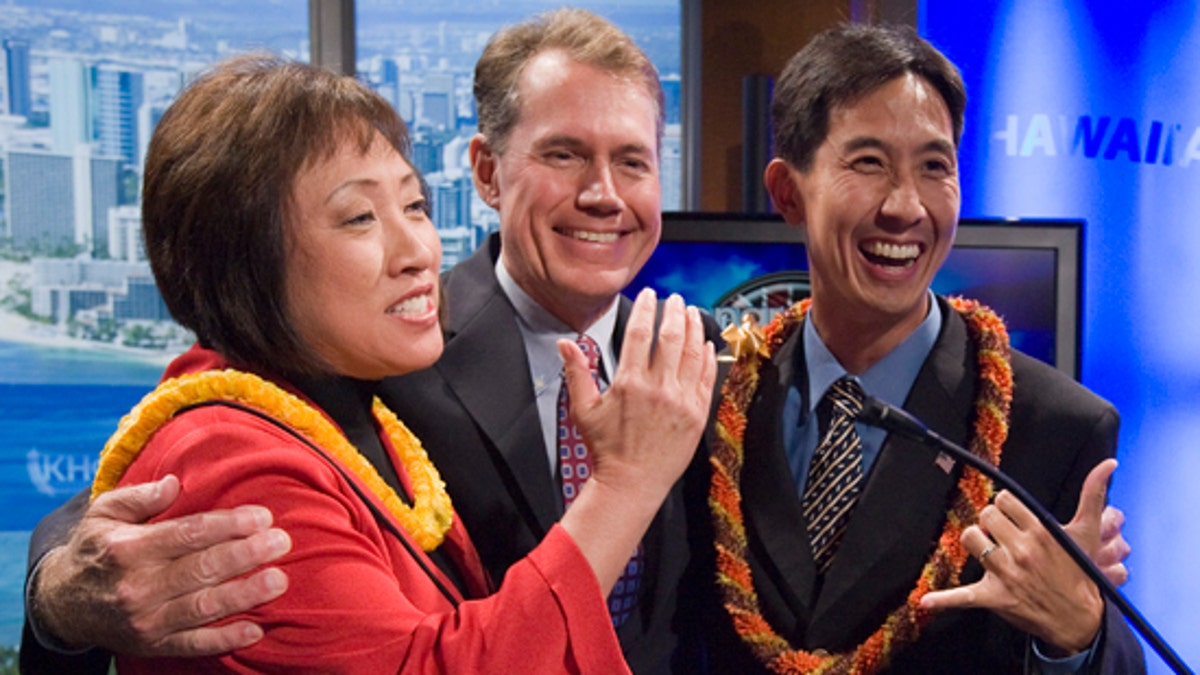
In this Friday, May 14, 2010 picture, Hawaii State Senate President Colleen Hanabusa, left, former U.S. Rep. Ed Case, center, both Democrats and Republican Honolulu City Councilman Charles Djou, right, embrace each other after patricipating in a debate at the KHON2 television studios in Honolulu. (AP)
HONOLULU - Former Democratic U.S. Rep. Ed Case said Sunday he won't run again for the Hawaii congressional seat won by a Republican candidate in a special election last week.
Case's announcement at the state Democratic Party convention likely gives state Sen. Colleen Hanabusa a clear shot at winning the party's nomination in the Sept. 18 primary—and gives Democrats a better chance of winning again in the district where President Barack Obama was raised.
Hanabusa would face Charles Djou in November. The former Honolulu City councilman became the first Republican in nearly 20 years to win a congressional seat from Hawaii when he won the May 22 special election.
Top Democrats had tried without success to persuade either Hanabusa or Case to withdraw to avoid splitting the party's vote in the special election. Case finished third, while Hanabusa earned second place—but both combined to win 58 percent of the vote.
Case on Sunday said his heart told him to stay in the primary race, but his head told him that would be the wrong fight.
"There's room for only one standard bearer for our party," Case told several hundred Democrats at the convention. "Anything else would only divide us, compromise the values we hold so dear, risk all we've worked so hard for."
Hanabusa called Case's decision "a most magnanimous gesture." She said she'll consult with him on how to woo his voting base of moderate Democrats.
Djou enjoyed solid support from state and national Republicans and ran a disciplined campaign focused on taxes and government spending at a time when Hawaii's tourism-driven economy remains troubled and the state is facing a $1 billion deficit.
In contrast, Democrats bickered over whether Case or Hanabusa was the strongest candidate for their party, and the situation got so bad that Obama and national party leaders weren't able to endorse one contender.
Instead, they aired television ads and made automated telephone calls that asked voters to chose "a Democrat."
Leading Democrats were ecstatic Sunday that Case and Hanabusa won't compete again in the September primary.
"I'm deeply moved," said U.S. Sen. Daniel Inouye, D-Hawaii, who had strongly backed Hanabusa in the special election. "It think it assures us of a great victory this November."
Former U.S. Rep. Neil Abercrombie, who held the seat for 20 years before resigning in February to run for governor, also said he was pleased with Case's withdrawal.
"It took a lot of guts to try to go for the greater good," he said.
Hanabusa said last week that the congressional district remained a Democratic district, and she pointed to the party's combined vote in the special election.
Hanabusa received 52,802 votes, or 30.8 percent. Case, received 47,391 votes, or 27.6 percent. Djou received 67,610 votes, or 39.4 percent.
Djou said in a statement that he looks forward to courting the almost 70 percent of voters who chose him or Case in the special election.
"Now voters will have a clear choice in November between the status quo and new leadership for Hawaii," he said.




